How to Increase Bile Flow and Why It Is So Important to Do So
Optimizing bile flow is one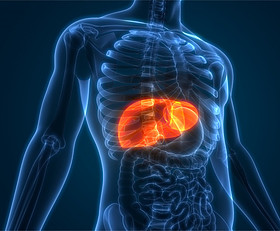 of the most important steps to take on most healing protocols, as bile plays many pivotal roles in the proper functioning of many key physiological processes.
of the most important steps to take on most healing protocols, as bile plays many pivotal roles in the proper functioning of many key physiological processes.
Here we will explore what bile is, its many important physiological functions, some of the most common reasons for poor bile production/flow, symptoms of poor bile production/flow, and several natural agents that can be used to effectively support this area.
Some of the links in this article are affiliate links. This means that if you click the link and subsequently make a purchase on the merchant’s website, we may earn a small commission at absolutely no additional cost to you. All opinions are entirely my own. I have used all products mentioned personally for years.
What Is Bile?
Bile is a yellow/green fluid that is made by the liver, stored in the gallbladder, and released into the duodenum (the first part of the small intestine) via the bile duct when it is needed.
Bile is mostly water, bile salts, cholesterol, phospholipids, electrolytes, and pigments such as bilirubin which is a waste product of hemoglobin (a protein in red blood cells that carries oxygen throughout the body and transports carbon dioxide to the lungs).
The liver is our largest organ after the skin, and is located on the right side of the upper abdomen under the right rib cage. The gallbladder is a small, pear shaped organ that sits right beneath the liver.
The liver, gallbladder, and duodenum are all connected via the biliary tract which includes the common bile duct.
Bile salts are one of the main components of bile that play a big role in its functions. Bile salts are produced from cholesterol in the liver.
4 of the Main Functions of Bile
Bile is responsible for a number of very important physiological processes including:
1. Digestion & Nutrient Absorption
One of the main functions of bile is to break down ingested fats into fatty acids so that the body can use them as energy. When fats are consumed, bile is released from the gallbladder to perform this task. 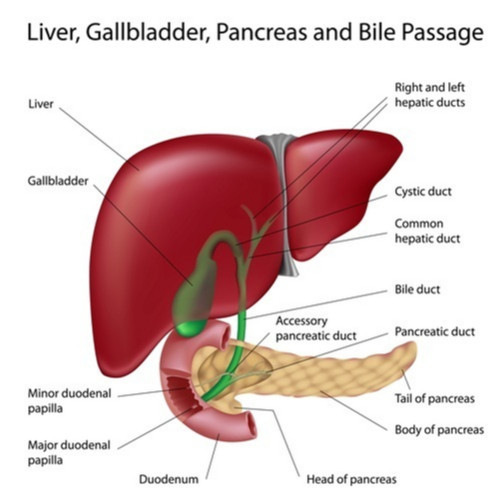
In addition, certain vitamins such as vitamins A, D, E, and K are fat-soluble, meaning they dissolve in fat and require the presence of fat and proper fat metabolism to be successfully broken down, absorbed, and assimilated by the body. Bile is required for the optimal digestion of fat and therefore for the proper absorption and assimilation of fat-soluble vitamins.
Bile is also needed for the digestion of essential fatty acids such as omega-3’s.
2. Detoxification
The liver uses 2 main phases in the detoxification process to break down and prepare toxins, pesticides, food additives, heavy metals, excess hormones, medications, metabolic byproducts, etc for elimination from the body.
One of the main ways these substances are then carried out of and eliminated from the body after they are metabolized in the liver is through the bile, into the small and large intestines, and out of the body via the stool.
3. Hormone Balance
One of the main ways bile helps to maintain hormone balance is by helping to convert the thyroid hormone T4 into active thyroid hormone T3. When bile is breaking down dietary fat, an enzyme is released that helps with this conversion. It is vital that T4 is converted successfully into active T3 because this is the form of the hormone that is usable by the body.
Excess hormones such as estrogen from ingested synthetic xenoestrogens (chemicals from conventional cleaning products, cosmetics, plastics, dryer sheets, etc that mimic the hormone estrogen in the body), plant phytoestrogens (chemicals found in some plants such as soy that mimic estrogen in the body) from food, the over-production of estrogen within the body, and from other sources are all metabolized in the liver and subsequently removed from the body in large part via the bile.
4. Immune Function
Once bile enters the gut, it activates T cells, which are immune cells that are responsible for attacking pathogenic organisms and foreign particles.
Bile also helps to support healthy levels of the immune regulatory T cell (TREG), which are cells that help to regulate inflammation levels in the body.
Poor Bile Production & Flow
Reduced bile production and poor bile flow can contribute to the development of many health conditions and symptoms. This is because the many important functions of bile are compromised when there is not enough bile present and/or if the bile is too thick and isn’t flowing properly.
That is, fats aren’t digested and assimilated properly which leads to nutrient deficiencies (specifically, of the fat soluble vitamins and essential fatty acids), toxins can build up causing many physiological imbalances and complications, hormone imbalances can develop because excesses aren’t being eliminated properly, and immune function can be reduced resulting in a higher likelihood of developing infection and/or increased inflammation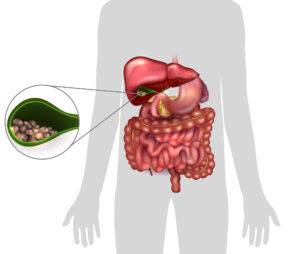 within the body.
within the body.
Bile flow dysfunction can also increase oxidative stress, explained further here.
An additional and very common complication of poor bile production and flow is the development of gallstones. Gallstones are firm deposits of bile that can develop in the gallbladder and within the biliary tract.
Gallstones can cause severe pain in the liver/gallbladder area, block bile ducts so that bile can not flow properly into the small intestine, and cause irritation and stress to the gallbladder organ. Blocked bile ducts and an overloaded gallbladder can also result in “gallbladder attacks” which are very painful episodes that often involve nausea, vomiting, severe pain, fever/chills, and more.
Some of the main causes of poor bile production, thickened bile, and reduced bile flow are:
- Chronic stress
- Chronic inflammation, which a great deal of chronic illnesses involve
- Poor diet
- Liver congestion, which is extremely common in today’s world where the liver is constantly working to detoxify environmental pollutants, chemicals, heavy metals, food additives, etc
- Dehydration
- Low hydrochloric acid production, as adequate stomach acid production helps to stimulate the production and release of bile
- Pancreatic dysfunction
- As we age, bile production decreases and thickens
- Expression of gene variants that involve bile production and flow
Symptoms of poor bile production and flow:
- Pale, gray, or light colored stool (bile is what gives stool its brown color)
- Digestive upset such as bloating and gas after meals, especially those containing higher levels of fat
- Nausea
- Constipation
- Pain under the rib cage or between the shoulder blades
- Dizziness
- Insomnia
- Hormone imbalance such as low thyroid function and/or estrogen dominance
- Weight gain or weight loss
- Fatigue
- Brain fog
- Dry skin and hair
- Gallbladder attacks
- Many more
Choleretic Agents
Anything that helps to promote the production and flow of bile is called a choleretic. There are several natural choleretic agents that stand out and are wonderful additions to most healing protocols.
-
Beets
Beets are a brilliant addition to most healthy eating plans for a variety of reasons.
They help to raise nitric oxide levels (which helps with immune function, balancing blood pressure, and more), contain methyl donors (which help with detoxification, promoting optimal gene expression, and much more), are anti-inflammatory, are a great source of fiber, prebiotics (which help the good bacteria in your gut flourish), and vitamins and minerals such as folate (huge for optimal gene expression, red blood cell formation, growth & development, and more) and manganese (helps to balance copper levels, maintain bone health, metabolize amino acids, and more).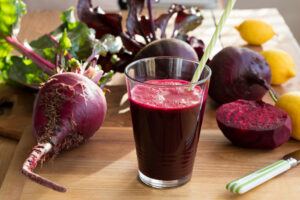
They are also excellent at promoting and stimulating bile flow.
Beets are rather high in sugar, however if they are one of the few items that are consumed with a higher sugar content, this is usually acceptable.
Consuming them raw most of the time allows for most of their health benefits to remain at their maximum capacity, as cooking can slightly reduce nutrient content.
Juicing beets is an excellent way of consuming them. You can juice them with an at-home juicer, add beets to any juice purchased at a fresh juice bar, or there are organic bottled beet juices as well. They can also be shredded and added to salads and entrees.
There are also beet powder supplements that are sold as capsules and loose powder that can be added to smoothies, juices, and water.
-
Carrots
Carrots are an excellent source of beta-carotene (which converts to vitamin A in the body and helps with eye health, immune function, antioxidant activity, thyroid health, and more), fiber (helps with digestion, detoxification, keeping the gut balanced, and more), potassium (an electrolyte mineral that helps with adrenal health, to maintain fluid levels inside of our cells, heart health, muscle contractions, and more) and vitamin K (helps with blood clotting, bone health, heart health, and more).
The beta-carotene in carrots is also a form of carotenoid, which acts as a choleretic agent and helps to promote bile flow.
While eating cooked carrots is just fine as part of a whole food diet, making sure to eat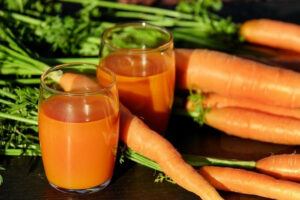 some raw carrots is also beneficial to acquire all of the health benefits of this root vegetable.
some raw carrots is also beneficial to acquire all of the health benefits of this root vegetable.
Carrots can be juiced at home, at a fresh juice bar, or purchased as a bottled juice. There are bottled juices sold that are just carrot juice, which is excellent, Bolthouse Farms has a good one.
They can also be shredded on salads and entrees, or be eaten by themselves as a snack alone or with hummus or a low sugar salad dressing.
-
Artichoke
Artichokes are a great source of fiber, prebiotics, vitamin C (great for immune function, adrenal health, antioxidant activity, tissue repair and much more), vitamin K, folate, magnesium (a foundational mineral that is great for adrenal health, balancing the stress response, is anti-inflammatory, helps with bone and heart health and much more), and phosphorus (important for carbohydrate and fat metabolism, bone health, cell & tissue repair, and more).
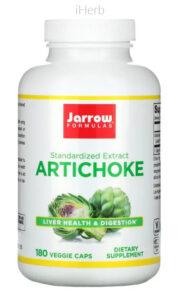 They also help to stimulate bile flow in the liver.
They also help to stimulate bile flow in the liver.
Artichokes can be eaten raw or cooked. Again, cooking slightly lowers their nutrient content so it is good to ensure that some raw artichoke is included as well.
Artichoke extract can also be consumed as a supplement.
Jarrrow Formulas Artichoke extract has been the best quality and most effective artichoke supplement that I have used. I take it daily.
It is of course excellent to eat plenty of fresh artichoke but a supplement can be helpful and convenient as well.
Dosing is particular to the individual, but the standard dose for this product is 1 capsule per day with food.
I take 1 capsule per day with lunch.
Click here to check it out.


-
Dandelion Root
Dandelion root has many health benefits. It is loaded with prebiotics, is anti-inflammatory, is an excellent antioxidant, helps to balance blood pressure and blood sugar, is a diuretic (can help with water retention), and helps to prevent liver damage.
It is also an excellent choleretic!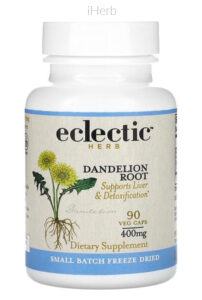
Dandelion is usually consumed as a supplement and it can also be consumed as a tea.
Eclectic Herb Dandelion Root has been the best dandelion supplement that I’ve used out of the several that I have tried.
Eclectic Herb utilizes small batch freeze dried herbs that are harvested from their farms in the USA. Small batch freeze drying naturally preserves the herbs while concentrating the healing nutrients within the plant for the best quality and most potent supplement.
This product is gluten free and non-GMO.
It has been a key part of my detoxification and hormone balancing protocol.
Dosing is always particular to the individual, but the standard dose for this product is 1 capsule 1 to 3 times per day on an empty stomach/between meals.
Click here to check it out.


-
Bitter Greens and Chicory
Bitter greens such as arugula and watercress as well as chicory such as radicchio and escarole are all excellent at stimulating bile production. They can also help to thin the bile.
These are available in the produce section of most grocery stores and can be prepared in a wide variety of ways. You can add them to salads, saute them, include them in smoothies and juices, or eat them by themselves.
-
Ox Bile
Ox bile is used as a supplementary form of bile. This can be helpful if you have had your gallbladder removed, or if your own bile production is low as a result of the above mentioned causes.
Ox bile essentially provides essential bile salts that help to perform all of the important roles of bile as described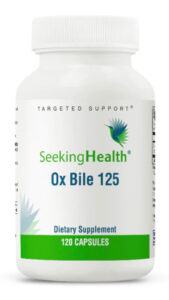 above.
above.
Seeking Health Ox Bile is an excellent form of supplemental bile that is gentle and effective.
This product has helped me the most with post-meal bloating. It has also been helpful as part of my heavy metal detox and hormone balancing protocol.
It is a capsule supplement that is usually taken with any meal that contains fat.
Click here to check it out.
Seeking Health is one of my absolute favorite supplement lines. I have been using their products for many years.
They use high quality, gentle ingredients that are hypoallergenic. They also formulate many of their products in consideration of unique sensitivities and needs associated with our particular clinically significant gene variants.
⭐️Use code HJE10 for 10% off of your purchase at Seeking Health :)⭐️
Note: All of the above are also excellent low sulfur liver supports which is great for those who have a sulfur sensitivity, as most liver supports are high in sulfur. Sulfur sensitivity can be caused by several factors including expressive gene variants such as CBS and SUOX, hydrogen sulfide Small Intestinal Bacterial Overgrowth (SIBO), and more.
In Closing…
As we’ve explored here, bile is a very important component of our physiological function. Addressing this area and making sure that one’s bile production and flow are optimized is a very beneficial step in healing.

REFERENCES